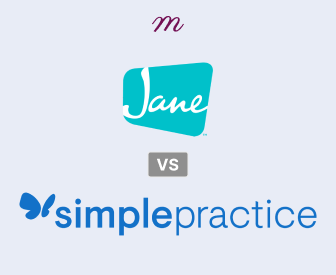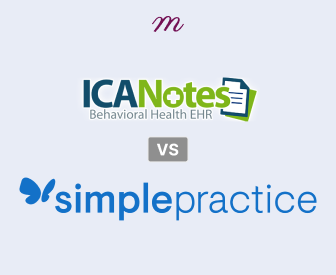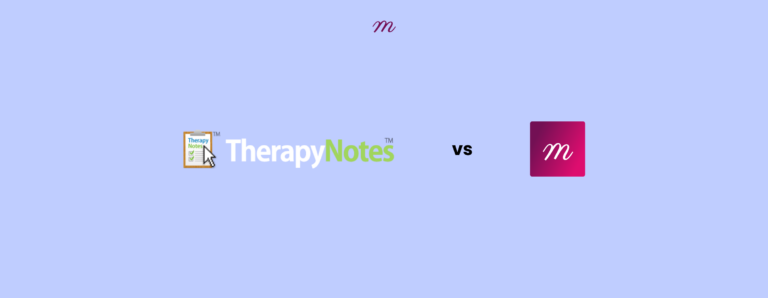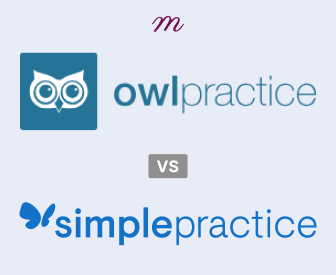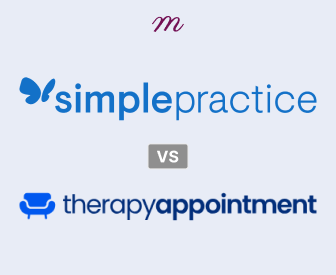Have your progress notes written for you automatically
Therapy practice management software (PMS) assists psychotherapists and counselors in running their practices. The best options combine electronic health records (EHR) and customer relationship management (CRM). In other words, great platforms include client documentation, privacy compliance, and client-focused features and tools.
Before therapists sign up for practice management software, they must consider their practice goals and needs. This article compares two popular PMS platforms, SimplePractice and Jane, both of which are appropriate for mental health professionals. Each allows clinicians to manage administrative tasks like billing, scheduling, and client communication. Each platform offers similar core features as well as unique components and strengths. Therapists should evaluate their needs before selecting practice management software that fits their practice best.
Overview of Jane
Jane Software, Inc. created the Jane App, a PMS platform for mental health clinicians that allows them to manage daily tasks easily. Like other EHR and PMS platforms, Jane allows therapists to schedule session appointments, manage client documentation, and process payments. Here are Jane’s key features:
Online appointment scheduling
Client profiles and charting
Centralized platform to securely store and access client records
Invoicing and payment processing
Email notifications and reminders
Compliant with HIPAA, PIPEDA (Canada), and other international data protection laws, emphasizing the security and confidentiality of client data
Group telehealth
Client portal
Insurance claim management
Cloud-based software
Supports multiple disciplines within a single practice, including medical doctors, chiropractors, physiotherapists, and mental health professionals
Charting templates that can be customized extensively and shared within the Jane community
User-friendly interface, but with a slightly steep learning curve due to extensive customization options
API for integration with other software, enhancing flexibility for tech-savvy clinicians
Jane offers three subscription plans, each offering access to the standard features, including one license, online booking, credit card processing, unlimited file storage, and free data imports. Group appointment scheduling is an additional $15/month.
Jane does not offer a free trial or free plan, but interested therapists can schedule a free demonstration with a member of the Jane team.
Jane Plans and Fees
Balance Plan: $39/month (Single practitioner profile, up to 20 appointments per month, unlimited admin and locations)
Practice Plan: $79/month (Plus $17.50/month per half license, plus $35/month per full license, unlimited appointments, admin, and locations)
Thrive Plan: $99/month (Plus $20/month per half license, plus $40/month per full license, unlimited appointments, admin, and locations plus additional benefits)
Jane offers phone, email, and live chat customer service Monday through Friday during normal business hours. There is typically a wait time of less than five minutes, and email response time tends to be less than 24 hours. Jane offers a library of resources and an extensive FAQ, which includes how-to guides and informational documents.
Jane allows mental health professionals to run their practices out of one platform rather than using multiple software, which can become expensive! Thanks to its cloud-based software, the practitioner login can be accessed anywhere. Clients can use a QR code to check in for their appointments. Jane is a HIPAA-compliant platform, meaning client information and data are protected and secure.
Jane is best for practices with a growing client base, especially those primarily focusing on telehealth appointments.
Pros & Cons of Jane
While Jane has many benefits, it’s important to weigh its pros and cons. Consider the following:
Pros
User-friendly interface. Jane's user-friendly interface makes navigating the software easy for mental health professionals. Jane's simple and well-organized design allows users to find features quickly without confusion or a steep learning curve. This user-friendly design boosts efficiency and productivity.
Robust scheduling and appointment management. Jane's scheduling and appointment management tools are very effective. Clinicians can easily manage their schedules, see upcoming appointments, and make necessary changes. The software also includes features like waitlist management and recurring appointments, making the scheduling process smoother.
Efficient billing and invoicing tools. Jane simplifies billing and invoicing by automating tasks like generating invoices, tracking payments, and managing insurance claims. This feature saves time and reduces the chances of errors and delays in payments – allowing therapists to focus more on client care instead of administrative tasks.
Cons
Limited customization options. Even though Jane has many features, some users might find the customization options limited. It offers predefined templates and settings, which may not meet every mental health practice's specific needs. Jane continually updates its software based on user feedback to improve customization options.
Additional costs for certain features. Although Jane's basic plan includes essential features, certain advanced features or add-ons incur additional costs. Therapists should assess their needs and budget before opting for additional features. These extra features can add significant value and greatly improve practice management.
SimplePractice Overview
SimplePractice is a widely used and trusted PMS platform that offers numerous features, such as a client portal, invoice creation, payment processing, and custom templates for intake forms, consent forms, treatment plans, streamlined reports, and assessments. Advanced features set SimplePractice apart from similar platforms.
Here are SimplePractice’s key features:
Clean, easy-to-navigate, intuitive interface, making it accessible even for therapists who are not tech-savvy
Centralized client portal
Client profile and charting
Clinical note-taking
Invoicing and billing processing
Appointment scheduling and reminders
Customizable templates for documentation
Comprehensive document storage and management system
Detailed reports and analytics to monitor a practice's performance, track revenue, and identify potential areas for improvement
HIPAA-compliant
Insurance claim management
Live customer support
Telehealth solution fully integrated within the platform, allowing for seamless virtual sessions
Highly rated, robust mobile app that allows practitioners to manage their practice from anywhere
Good integration capabilities with other tools like Google Calendar and Apple Health
Therapists can use the platform as solo practitioners or as part of a group practice. Each plan includes unlimited clients, client portals, invoicing, and payment processing. Base plans include live customer support and access to the mobile app. With the group plan, clinicians can add as many colleagues and managers as they wish for an additional monthly fee.
SimplePractice offers a 30-day free trial, granting therapists access to all features before committing to any particular subscription.
SimplePractice Plans and Fees
Solo practice (Starter Plan): $29/month
Solo practice (Essential Plan): $69/month
Solo practice (Plus Plan): $99/month
Group practice (Plus Plan): $158/month ($99 for the first clinician, $59 for each additional clinician)
SimplePractice has an excellent customer support team, allowing therapists to connect with the team during typical business hours through live chat, email, or via the Help Center, with guides and tutorials to troubleshoot problems. SimplePractice also offers webinars and classes led by experts. One-on-one 30-minute training sessions are an option to discuss the platform, ask questions, and learn more about the benefits of the platform.
Many therapists switch from other EHR software to SimplePractice because of its impressive range of features. SimplePractice simplifies the transition with an efficient and straightforward system for switching to their platform. Therapists can export data, upload client lists, and immediately start using SimplePractice in just a few steps.
SimplePractice is ideal for telehealth mental health professionals, psychotherapists, and counselors. This HIPAA-compliant platform allows users to operate their practices from one platform.
Pros & Cons of SimplePractice
Like any software, SimplePractice has its pros and cons. Consider the following:
Pros
Versatile and feature-rich platform
Integrated telehealth capabilities
Excellent customer support
Cons
The steep learning curve for beginners
Higher cost compared to some competitors
Comparing Jane & SimplePractice
Software Features.
Both platforms offer access to standard features and are specifically designed for mental health professionals. Both are HIPAA-compliant and provide shared client documentation and group scheduling. Jane is excellent for appointment scheduling and ease of use, while SimplePractice is known for its versatile features, including telehealth capabilities and advanced analytics.
Pricing.
Jane and SimplePractice offer paid subscription plans with several choices depending on a therapist’s needs. Users can create a solo practice account or sign up as a team, allowing the addition of multiple clinicians to the team for additional monthly fees. SimplePractice’s least expensive plan is $29/month, while Jane’s plans start at $39/month (current special price as of May 2024). Jane does not offer a free trial, while SimplePractice offers a 30-day free trial with all plans. SimplePractice offers a comprehensive package but at a slightly higher price. The right choice depends on the practice's specific needs and budget.
Usability.
Both platforms are designed to be user-friendly, but Jane is often praised for its intuitive interface and ease of navigation, making it suitable for therapists of all tech-skill levels. SimplePractice may have a steeper learning curve for those less experienced with PMS. Clinicians note a slight learning curve when using both Jane and SimplePractice, but numerous tutorials assist users in setting up their accounts.
Customer Support.
Jane and SimplePractice have customer support teams available during regular business hours, generally via email or live chat. Jane also offers phone customer support, while SimplePractice does not currently offer this option. Both platforms have resource libraries and FAQs, including how-to guides, tutorials, training webinars, videos, and troubleshooting articles. SimplePractice offers live onboarding sessions, allowing therapists to meet directly with a team member to walk them through the software and answer questions.
Choosing Between Jane and SimplePractice
Choosing the most appropriate platform depends on therapy practice goals, budget, and personal preferences. Jane and SimplePractice include standard tools and features, but clinicians must consider their practices' specific needs while reviewing each platform's specifications. Here are some suggestions:
Choosing Jane:
Best for multi-practice mental health teams and clinics. While other PMS tools focus on helping only therapists or counselors, Jane caters to all healthcare practitioners. This makes Jane a great option for clinics or growing healthcare teams with members operating in various fields. Adding additional clinicians to Jane is more affordable than other platforms, such as SimplePractice.
Choosing SimplePractice:
Best for therapists searching for an extended free trial to “try out” the platform. SimplePractice surpasses many PMS and CRM platforms with its extended free trial period. Some therapists may need additional time to familiarize themselves with the platform by testing the software and accessing all features – in addition to meeting with the support team to answer questions before commitment.
Conclusion
Both SimplePractice and Jane offer robust features for practice management but cater slightly differently based on professional needs and the scale of operations. SimplePractice may be better suited for solo practitioners and small practices due to its straightforward setup and ease of use, while Jane may work better for large clinical teams, multi-disciplinary practices, or clinicians requiring high levels of integration.
No matter the size of the practice, therapists want to incorporate effective, efficient, and powerful systems to run their practices with ease. Jane and SimplePractice offer impressive features, so choosing which PMS is best for the practice depends on goals, desired features, budget, and needs. By carefully evaluating the main features of each platform, therapists can make informed decisions to optimize their practice operations.


